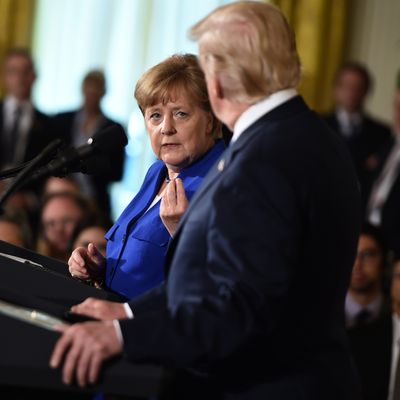
Europe can’t keep doing this. All of this. It’s the same charade, over and over:
1) The United States threatens to do something mindlessly destructive.
2) European leaders meet with the monstrous clown the American people chose to represent them.
3) They try to reason with the nightmare caricature of Yankee chauvinism; then to flatter to him; finally, they beg him, as though asking the U.S. not to sabotage its own interests is some kind of favor.
4) He pretends to consider their perspective — then does whatever he thinks his fellow Fox News viewers want him to do.
So it was with the Paris climate accord, the steel and aluminum tariffs, the embassy in Jerusalem, and finally, this week, the Iran nuclear agreement.
That last one might just be unforgivable. Less than three years ago, the U.S. promised Britain, France, and Germany that it would suspend sanctions on companies and countries that did business with Iran, so long as Tehran suspended its nuclear weapons program. British, French, and German firms proceeded to make investments and forge business relationships in Iran. The Iranian regime ditched its highly enriched uranium, tolerated an invasive inspection program, and fully complied with its obligations under the agreement. The United States denies none of this.
But it has decided to break its word, and reimpose sanctions on its allies anyway. Europe was willing to address America’s concerns — to forge some side agreement to combat Tehran’s ballistic missile program, or deter its interventions throughout the Middle East. But the bizarre philistine whom the Americans chose to lead them had no interest: He preferred to sabotage a viable nonproliferation agreement, strand European assets in Iran, and undermine America’s credibility on the world stage —ostensibly, just so he could go on television and announce the death of his predecessor’s signature diplomatic achievement.
It’s just too much. Transatlantic relationships are supposed to be two-way streets. Europe is a full-grown political and economic union, with the world’s largest economy, best museums, and a respectable stash of nuclear weapons — it deserves better than this.
Such is the mood in Brussels this week, where EU leaders are determined to thwart Donald Trump, save the Iran deal, and, perhaps, begin formulating a new foreign policy that might allow the bloc to assert more independence from the basket case on the other side of the Atlantic.
“At this point, we have to replace the United States, which as an international actor has lost vigor, and because of it, in the long term, influence,” Jean-Claude Juncker, the president of the European Commission, told Belgium’s Flemish regional parliament.
Meanwhile, a senior adviser to the European Union told the New York Times that “Trump and Europe have fundamentally different objectives,” and “we have to stop being wimps.” Other officials called for putting “more teeth into talks with Washington,” and asked, “Can’t we defend what our own interests are?”
Alas, that question might be less rhetorical than it sounds. The foreign ministers of Britain, France, and Germany are preparing to meet with Iranian officials on Monday to determine how the agreement can be preserved without the United States’ cooperation. The fundamental challenge is finding a way to ensure that Iran still derives enough economic benefits from the agreement to override its interest in pursuing a nuclear weapon. European politicians are ready to take radical measures to realize that objective — but European businesses might not be.
EU leaders have discussed providing firms that do business with Iran special financing from the European Investment Bank, and passing legislation that protects European firms from American sanctions — modeled after a “blocking regulation” from 1996 that deflected sanctions against European companies that violated America’s Cuba embargo.
But even if Europe goes forward with such confrontational measures, its corporations might still see little profit in jeopardizing their access to the American market: Most companies have much less to gain by embracing Tehran than to lose by alienating Washington; America’s banking system is more valuable than Iran’s oil fields.
Europe may be ready to treat Trump as adversary. But it’s not clear whether it has the resources to defy his will.






























